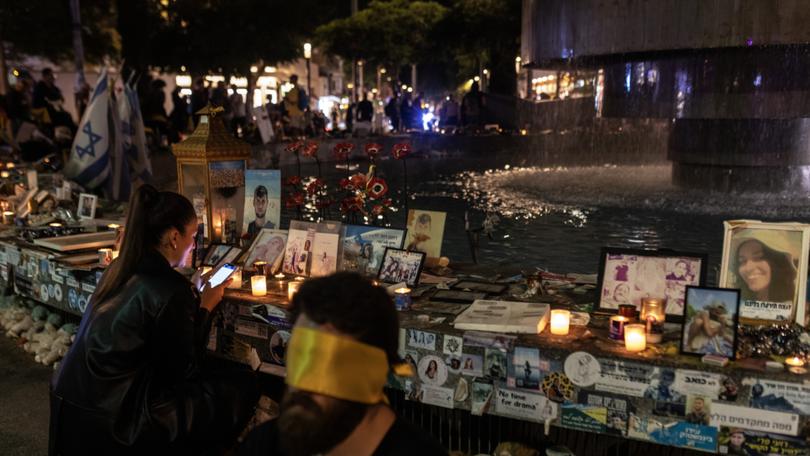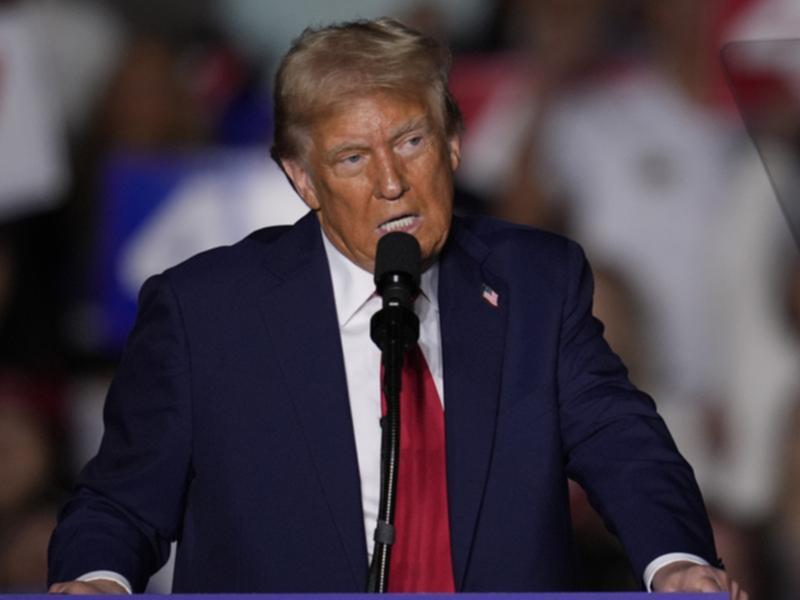THE WASHINGTON POST: How US elections could shape Israel’s multifront Middle East war
US and Israeli officials, as well as diplomats, see Tuesday’s election as a critical inflection point — with the outcome likely to inform Benjamin Netanyahu’s actions not just in Iran, but in Gaza as well.

The Biden administration spent weeks persuading Israel not to strike oil or nuclear facilities in Iran, fearing it could propel the region into an even more dangerous phase just before Americans head to the polls. After relatively limited Israeli attacks over the weekend, the Middle East appears to have edged back from the cliff.
But the reprieve could be short-lived. U.S. and Israeli officials, as well as diplomats and regional experts, see Tuesday’s election as a critical inflection point — with the outcome likely to inform Prime Minister Benjamin Netanyahu’s actions not just in Iran, but in Gaza as well.
“The elections will define a lot of what Israel’s going to prioritize,” said Amir Avivi, a reservist brigadier general and former deputy commander of the Israel Defense Forces’ Gaza division. “The strategic goals are the same, but what will happen when, and when polices are going to be pushed depends on the results.”
Sign up to The Nightly's newsletters.
Get the first look at the digital newspaper, curated daily stories and breaking headlines delivered to your inbox.
By continuing you agree to our Terms and Privacy Policy.Whoever wins, Israeli hawks are eyeing President Joe Biden’s lame-duck period as a potential opportunity to elicit U.S. support for more far-reaching strikes on Iran, hoping the outgoing administration will be less wary of political blowback at home.
In Gaza, where Israel’s punishing military campaign against Hamas has laid waste to the Palestinian enclave and created a humanitarian catastrophe, the outcome of the election could have major implications for the future of the war. Already, the looming vote appears to have stalled new negotiations on a cease-fire and hostage release deal.
“There is not going to be any progress on the talks until Netanyahu sees who is going to be in the White House,” said a person familiar with the thinking of Israel’s senior leadership, comments echoed by a diplomat familiar with the matter. Like others in this story, they spoke on the condition of anonymity to discuss sensitive issues.
Senior Israeli leaders are not of one mind on which candidate would be better for their nation as it navigates its multifront war, the person said.
In a phone call with Netanyahu earlier this month, former president Donald Trump offered his support for the wars in Lebanon and Gaza, telling the prime minister to “do what you have to do.”
Most in Israel remember him as the president who delivered one right-wing priority after another, including recognizing the annexation of the Golan Heights, moving the U.S. Embassy to Jerusalem and declaring that Washington no longer considered West Bank settlements to be illegal under international law. But the Republican candidate’s unpredictability means he is viewed as a wild card.
While Vice President Kamala Harris has been more critical than Biden of Israel’s conduct in Gaza and has voiced more sympathy for Palestinians, it is unclear how much she would actually alter his policy of nearly unconditional military and diplomatic support.
A Harris administration might have “slightly” more potential to restrain Israel, said Brian Katulis, senior fellow for U.S. foreign policy at the Middle East Institute. “Under a Trump scenario, you’re likely to see this embolden Israel efforts to move even for even more aggressively forward without any restraint.”
Iran
After the success of this weekend’s strikes across Iran, hard-liners in the Israeli government - and some opposition leaders - have called on Netanyahu to deliver a more decisive blow against the country’s nuclear research program and uranium enrichment sites.
National Security Minister Itamar Ben Gvir described the strike as an “opening blow,” saying Israel has a “historic obligation” to remove the Iranian threat.
While the Biden administration has publicly discouraged that step, and analysts said Harris probably would urge similar caution, Trump has been critical of diplomatic efforts to constrain Iran’s nuclear ambitions - exemplified by his 2018 decision to withdraw the United States from the international nuclear deal with Tehran.
For now, Israel’s defense establishment is satisfied with the blow it just delivered. But if Iran retaliates, a bigger strike would be on the table.
“Israel could not go back and bomb Iran like that without the Americans on its side,” said the person familiar with the thinking of Israel’s senior leadership. “Trump has said he’s going to control Iran. He might make that kind of military action more likely.”
The recent strikes severely damaged Iran’s air-defense network near critical sites, according to analysts, including near some nuclear research facilities, leaving them more vulnerable to future attacks.
“Israel left Iran without eyes,” said Gayil Talshir, a political scientist at the Hebrew University of Jerusalem. “Should Trump return, he and Netanyahu might be tempted to strike” the country’s nuclear program.

But Trump has also been clear that he does not want the United States embroiled in foreign conflicts. “Netanyahu wants to drag the United States into a war with Iran,” said Alon Pinkas, a veteran Israeli diplomat. “That’s not likely to happen under Trump, who is war-averse.”
During a CBS News “60 Minutes” interview earlier this month, Harris said that preventing Iran from becoming a nuclear power would be one of her highest priorities in office. But when asked if she would take military action to prevent it, she declined to discuss “hypotheticals.”
While Harris probably will try to prevent a wider confrontation between Iran and Israel, Katulis said, “I don’t see the leverage there,” acknowledging the limits of U.S. influence. Under Biden, Israel has angered U.S. officials by carrying out increasingly provocative operations against Iran without advance notice to Washington - including a deadly strike near an Iranian diplomatic facility in Damascus and the assassination of Hamas political leader Ismail Haniyeh in Tehran.
Whatever the outcome of Tuesday’s election, some Israelis hope that Biden - unfettered by election concerns - might be more supportive of a deeper strike in the case of Iranian retaliation. If there is a Trump win, Israel is more likely to wait until after Inauguration Day, Jan. 20, to have a coalition of support for a strike, Avivi said.
But “if Kamala wins,” he added, “Israel might not wait.”
Gaza
In Gaza, Israel has dismantled much of Hamas’s military infrastructure and, after a year-long manhunt, killed the group’s leader Yahya Sinwar, the architect of the Oct. 7, 2023, attack. Yet its military successes have seemingly brought the war no closer to an end, with Israeli forces further entrenching their presence along strategic corridors and returning to areas cleared months before.
New military operations against Hamas in the north this month, alongside Israel’s blocking of aid, has deepened an already dire humanitarian crisis, triggering an unusual letter from U.S. officials to Israel warning of possible cuts to military funding if Israel did not take immediate steps to improve the situation.
While Biden administration officials had hoped Sinwar’s death would provide a new opening for cease-fire negotiations, it has also given more weight to hawkish voices in Israel who say Hamas is on the run and are urging Netanyahu to keep up the military pressure.
CIA Director William J. Burns will be in Cairo on Thursday to discuss with his Egyptian counterparts a “process to secure the release of hostages,” a U.S. official said. White House officials Brett McGurk and Amos Hochstein, meanwhile, will visit Israel on Thursday for discussions on Lebanon and Gaza, the official said.
Despite the flurry of diplomatic activity, U.S. and Israeli officials say any cease-fire and hostage release agreement is virtually impossible before Tuesday’s election, as Netanyahu waits to see who emerges victorious. A Trump win could incentivize Netanyahu to delay any major decisions on Gaza even further - possibly until after Jan. 20 - despite pleas from the families of Israeli hostages that time is running out for their loved ones.
Of the more than 100 hostages still held by Hamas in Gaza, only a few dozen are still believed to be alive, according to Israeli authorities.
Trump has long surrounded himself with staunch pro-Israel ideologues, including David Friedman, his former bankruptcy lawyer turned ambassador, who is a longtime ally of Israel’s settler movement. Trump’s financial backers include powerful allies of Netanyahu and long-standing Israel advocates, including Miriam Adelson, who has put $100 million into a pro-Trump super PAC.
A Trump win could “release any constraints that might be on the state of Israel, letting Israel finish the job” in Gaza, said Michael Oren, a former Israeli ambassador to the United States.
How Biden will act in his last days in officer is less clear, he said. “We talk about a lame-duck president being unfettered in supporting a military strike against Iran,” he said. “But the same president might be unfettered in taking punitive measures against Israel on Gaza.”
Given Trump’s close ties to the settler movement, his return to the presidency could embolden far-right voices advocating a return of Israeli settlements in Gaza, which were dismantled when Israeli troops pulled out in 2005. Biden has imposed sanctions on extremist settlers and illegal Israeli outposts, though they have had little impact on Israel’s aggressive land seizures in the occupied West Bank.
A Harris presidency would be seen in Israel as a continuation of the Biden administration, which has given the country unwavering political, economic and military support, alongside public pleas to improve aid flows and protect civilians. Though the United States has gestured at conditioning military aid to Israel on several occasions - and put a hold on the shipment of some large bombs earlier this year - it has done little to stay Netanyahu’s hand in Gaza or alter the course of the war.
“There are those in government who say there will never be another Zionist president like Biden and he will be missed,” said the person familiar with the thinking of Israel’s senior leadership. “They expect Harris would be tougher on Israel.”
In March, in a speech commemorating the anniversary of Bloody Sunday in Selma, Alabama, Harris opened by talking about the humanitarian crisis in Gaza: “Too many innocent Palestinians have been killed,” she said, the kind of direct statement Palestinians had long wanted to hear from Biden. Since Harris became the Democratic nominee, though, those close to her have signaled no major changes should be expected.
“She will continue to work to protect civilians in Gaza and to uphold international humanitarian law,” Harris’s national security adviser Phil Gordon wrote on social media in August. But she will “always ensure Israel is able to defend itself against Iran and Iran-backed terrorist groups,” he said, and “does not support an arms embargo on Israel.”
Palestinians are not pinning hope on either candidate, said Sabri Saidam, an adviser to Palestinian Authority President Mahmoud Abbas. “We long to see an American president who’s serious about ending the war immediately,” he said. “We need deeds, not words.”
© 2024 , The Washington Post
